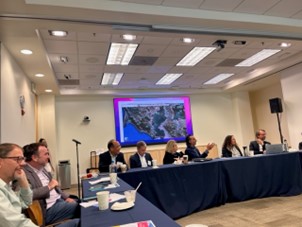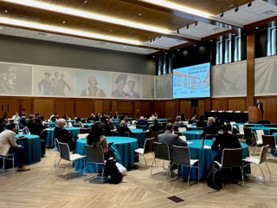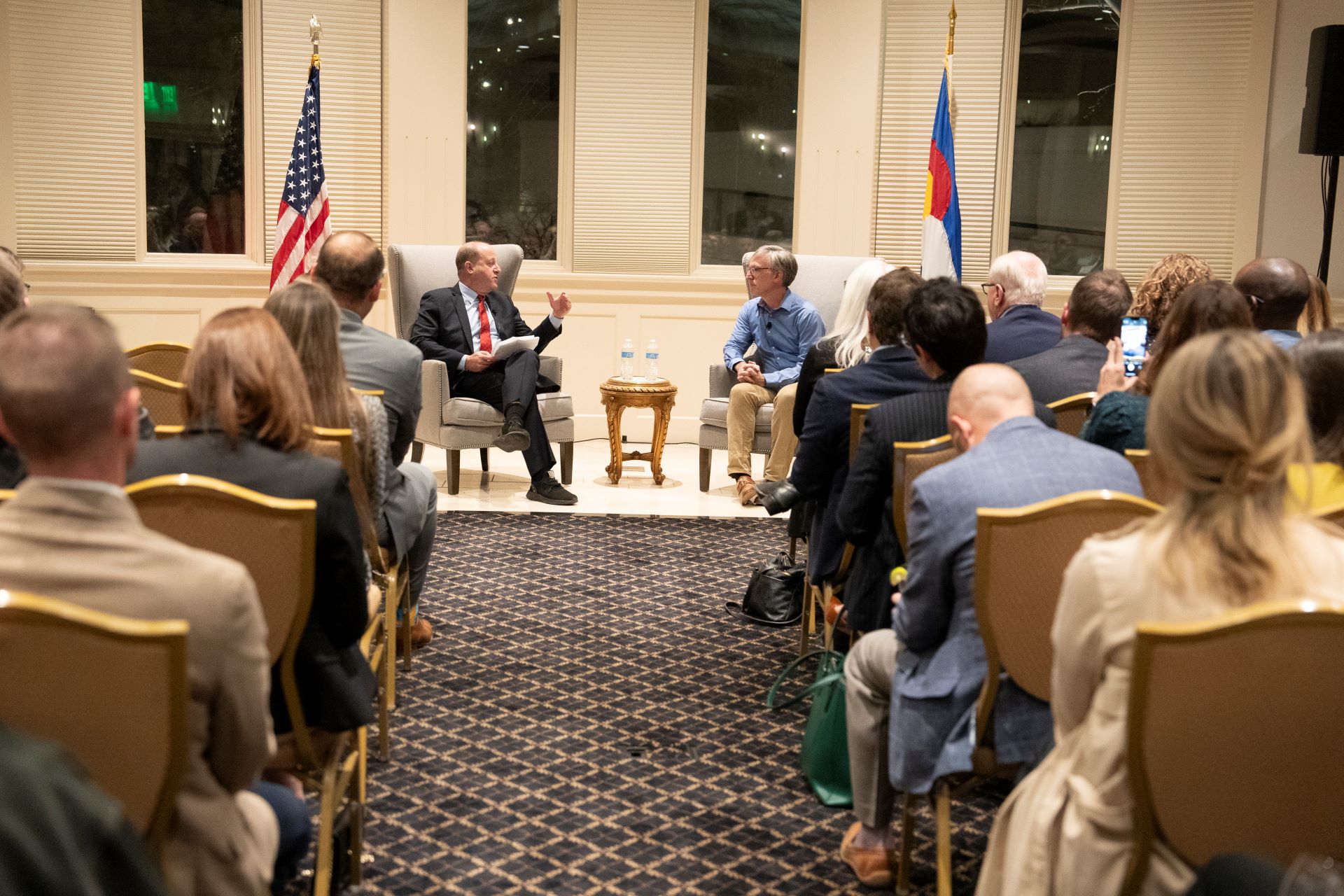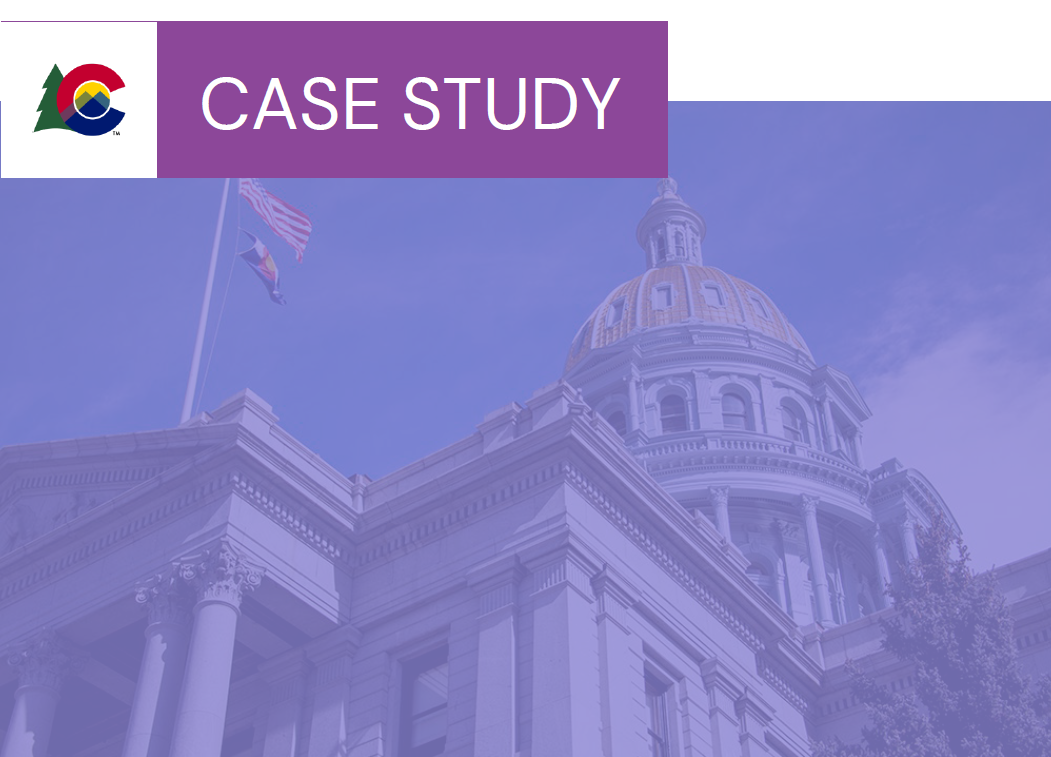As infrastructure funding begins to flow from the bipartisan Infrastructure Investment and Jobs Act (IIJA) and Governors look to combine federal funds with existing and new state and territorial capital programs to deliver key infrastructure investments, effective project financing and delivery is of critical interest. In this context, on Wednesday April 19 and Thursday April 20, NGA co-convened an Infrastructure Investment Forum at Stanford University, focused on innovative funding, financing and delivery of transportation projects.
The forum was held by NGA in partnership with the Build America Center, Stanford University Center on Democracy, Development and the Rule of Law, the U.S. Department of Transportation’s Build America Bureau, and the Global Infrastructure Investor Association. It brought together Governors’ Infrastructure Coordinators and Transportation Advisors, industry practitioners, federal and local government leaders, and academics, who all shared their experiences and insights on transportation infrastructure deployment.
The first day of the convening comprised several panel discussions on funding, financing and other key infrastructure delivery topics. The day kicked-off with a panel focused on state perspectives on delivering transportation projects, which was led by Morteza Farajian from the Build America Center and included Vicki Kramer, Director, Nebraska Department of Transportation, Shoshana Lew, Executive Director, Colorado Department of Transportation and Andrew Doctoroff, Michigan lead for the Gordie Howe International Bridge Project. The wide-ranging discussion covered issues such as critical opportunities arising from the IIJA, integrating transit with highway projects, and the essential role of project oversight. On the issue of project funding and financing, the panel discussed the role that the private sector can play in promoting innovation, the importance of thoughtful risk allocation, and the roles of instruments such as project development agreements during the construction and operational phases of a project.

This discussion was followed by a panel on innovative funding and financing from the perspective of the private sector, featuring Tom Osborne, Executive Director at IFM Investors, Dale Bonner, Executive Chairman at Plenary Concessions, and Steve DeWitt, Senior Vice President Business Development at ACS Infrastructure. Panelists discussed how private capital can support states and territories with the delivery of major infrastructure projects, even with the availability of additional federal funding, and reflected on the importance of developing strong partnerships with project owners across the project pipeline. The panel also discussed project characteristics that the private sector is generally looking for in state and territorial public private partnerships (P3s), including strong government support and commitment, and underscored the importance of the appropriate allocation of risks that does not overburden private partners or public owners. Other sessions held during the first day of the Forum included a panel on local government opportunities and challenges, an in-depth discussion on asset inventory mapping and long-term fiscal planning, and a discussion on the role of transit-oriented development in boosting transit ridership, providing affordable and accessible housing and offering a revenue stream if developed on underutilized government land.
On day two, our colleagues at Stanford University facilitated a closed-group tabletop session focused on delivering a complex transportation project. Participants were provided with a project scenario, which was followed by a discussion on different aspects of the project pipeline. This roundtable encouraged discussion on issues such as configuring the project to meet multiple objectives, the conditions required to secure interest from private financing, the critical role of relationships and project oversight during construction, and the challenges of infrastructure permitting.
During the afternoon of day two, the issue of infrastructure permitting came to the fore, with an open session run by Stanford University’s Center on Democracy, Development and the Rule of Law. Christine Harada, Executive Director of the Federal Permitting Improvement Steering Council, provided an overview of the Administration’s Fast-41 initiative, which seeks to improve the federal environmental review and authorization processes. Ms. Harada discussed the benefits of FAST-41 covered projects, including increased predictability, enhanced coordination and focused attention of federal agency leadership. Ms. Harada also advised that funding is available to transfer to federal, state and local government agencies and Tribes to support work related to federal environmental authorizations, and highlighted the promise of state-federal partnerships to streamline permitting processes.

This was followed by a talk by Dr. Francis Fukuyama, Olivier Nomellini Senior Fellow at Stanford University’s Freeman Spogli Institute for International Studies. Dr. Fukuyama characterized the U.S. permitting system as a “Vetocracy”, whereby excessive checks and balances have led to system paralysis. He proposed several paths forward, including streamlining procedures and the public consultation process, shifting enforcement from the private to the public realms and rebalancing federalism using principles of subsidiarity. A panel session on permitting rounded out the afternoon, featuring Alex Herrgott, President and CEO of the Permitting Institute, Steve DeWitt from ACS Infrastructure, Liz Klebaner, Partner, Nossaman LLP and Michael Bennon, Stanford University (moderator).
Additional Resources
NGA has developed a State Resource Center on Innovative Infrastructure Financing, which provides resources and information on infrastructure funding, financing and delivery options (see link here).
NGA also maintains implementation resources pages for the bipartisan Infrastructure Investment and Jobs Act, the Inflation Reduction Act, and the bipartisan CHIPS and Science Act which can be accessed here. These resource pages are updated weekly to provide the latest federal updates, including notices of funding opportunities, requests for information and guidelines, and the latest NGA, Association, and NGA Partner resources.













